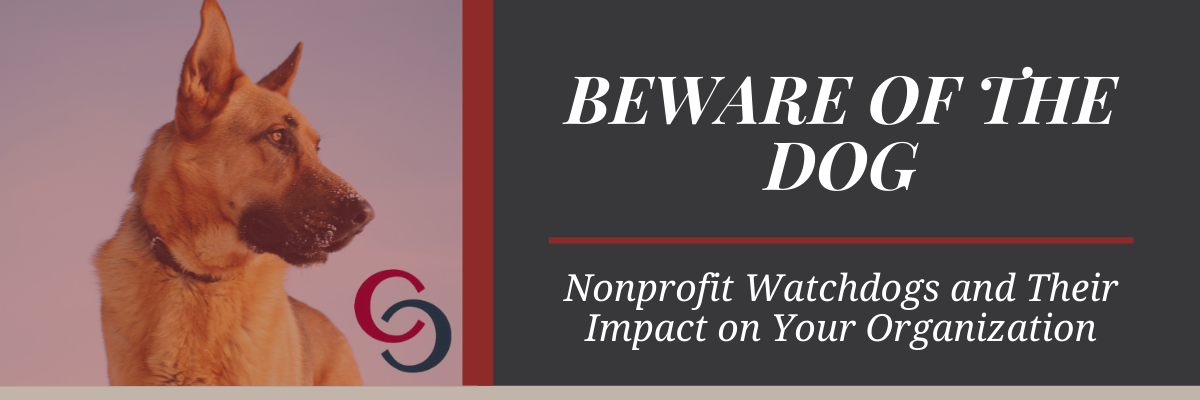
A nonprofit’s Charity Watchdog (CWD) rating helps set organizations apart. A specific rating could make prospective donors flock to a particular organization or warn them to steer clear of it. Because a nonprofit’s credibility is so intrinsically tied to its financial transparency and accountability, CWDs protect donors from illegitimate organizations and help them feel confident working with established, reputable ones. So, what’s a nonprofit to do? Understanding what CWDs are, how their ratings impact nonprofit organizations, and how to optimize CWDs ratings can help position your nonprofit to succeed.
Read on to learn about Charity Watchdogs (CWDs), including how the big four CWDs stack up against each other. Please note that this information is not exhaustive, nor is it the be-all and end-all of nonprofit operations and their performance. Instead, this is a friendly reminder that CWDs exist and how the rating of your nonprofit organization can impact its funding.
What Are Charity Watchdogs and Why Do They Exist?
Simply put, CWDs are independent organizations that exist to review and provide information about other nonprofit organizations. In the nonprofit world, new members and donations are critical. It can be difficult for a new nonprofit organization to get off its feet without a little fundraising, and even the most established organizations are reliant on public generosity. In certain cases, the collection of funds can get a bit murky. That’s why CWDs exist.
Donors arguably have a right to know how the nonprofits to which they donate allocate their funds. CWDs help review and rate nonprofits on their transparency and use of finances. There have been several studies about the efficacy of CWDs by directly polling donors. A huge number of those surveyed reported that a positive CWD rating would increase the likelihood that they would choose to donate. An even larger number reported that a poor rating would almost certainly deter them from donating. CWD ratings do matter to donors and nonprofits alike.
In a sea of CWDs, there are four big players:
- Charity Navigator: Over the past 19 years, this CWD has rated over 160,000 nonprofits. With close to a million registered users and over 11 million visits annually, Charity Navigator has a far reach and a strong reputation. Charity Navigator only rates organizations that meet a specific set of criteria. This includes, but is not limited to, U.S.-based 501(c)(3) organizations generating at least $1 million per year for two consecutive years that have been in operation for at least seven years. To be rated, nonprofits must also have a certain amount of public support and allocate a certain percentage of expenses to fundraising and administrative expenses. Charity Navigator rates nonprofits on financial health and accountability and transparency. Using a specific formula, Charity Navigator assigns a score to each nonprofit it rates, and that score, in turn, corresponds to a star rating out of five possible stars.
- CharityWatch: CharityWatch was founded in 1992 and, since then, it has worked diligently to “research and evaluate the efficiency, accountability and governance of nonprofit organizations,” as well as to educate the public about the importance of giving to reputable nonprofits and avoiding corrupt or unethical ones. CharityWatch has studied and reviewed in-depth nearly 700 charities, spending over 135,200 hours and reviewing over 16,000 tax and other financial documents to that end. CharityWatch fundamentally believes that nonprofits need a higher level of oversight and they are willing and able to provide it. They have a reputation as one of the tougher watchdogs, ranking charities on a scale from A+ to F. Uniquely, CharityWatch also reviews social welfare groups that are generally exempt from review by other CWDs.
- GiveWell: GiveWell is “a nonprofit dedicated to finding outstanding giving opportunities and publishing the full details of their analysis to help donors decide where to give.” GiveWell places much of its energy into analyzing the utility of various charitable organizations, recommending only the charities they believe have a bigger impact on helping communities. While GiveWell’s list of reviewed nonprofits is much smaller than other CWDs, GiveWell would say that their evaluation process is more intense. That being said, it also values quality over quantity and focuses on charities that the founders themselves would consider the best options for support.
- GreatNonprofits: GreatNonprofits is a watchdog organization with endorsements from the Bill and Melinda Gates Foundation, Give Kids the World, and more. They do not operate on a rating system but, rather, award badges to successfully marked charities that can be added to promotional material. Their primary draw is that they gather “stories” from communities around nonprofit organizations. These stories are then used to determine if the group qualifies for a certification as a top-rated nonprofit.
What Do CWDs Do? (How Watchdogs Keep Tabs on Nonprofits)
Most of us who work with or operate nonprofits understand the importance of accurately reporting the organization’s finances in a timely matter, not only to the IRS but, also, to board members, donors and other stakeholders. Most nonprofits must file the Form 990 annually, which are public record, and these filings are the primary source of information for CWDs.
CWDs also often report on the nonprofit’s financial health, viability, and any concerning spending patterns or practices. Though the regularity with which CWDs publish ratings varies from organization to organization (assuming minimum criteria is met), it is safe to assume that CWDs review this information at least annually.
Charity Watchdogs as Allies
To some, CWDs can feel like a thorn in the side of their nonprofit organization. After all, close public scrutiny by a widely accessed and highly reputable organization is not particularly fun, and it can be quite harmful to a nonprofit if their finances are not in order. Instead, putting your best foot forward and shifting your mindset regarding CWDs and their impact can yield some amazing results such as improved reputation and ultimately more donations. Maintaining strong internal controls and accurate accounting are important ways to keep a nonprofit running smoothly. Ensuring financial transparency by properly tracking and reporting donations will not only give donors peace of mind but can positively drive up your nonprofit’s rating. By paying close attention to ensure your numbers are in order, not only are you setting up your organization for success, you can additionally significantly increase your rankings from CWDs.
Stay tuned for Part 2 of our Beware of The Dog series where we will share tips and best practices on how you can increase your ratings.
Share This Post:

Chazin
With over 20 years working exclusively with nonprofits, we pride ourselves in having a unique understanding of nonprofit accounting needs. We believe that nonprofits deserve personalized, quality service and should not settle for a one-size-fits-all approach. We collaborate with you to provide a fully virtual and customized solution that is not only cost-effective but also strengthens your accounting function. We offer a team of industry experts at your disposal to provide advice, leading technology, and to supplement existing staff to improve efficiency and compliance.